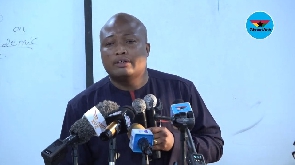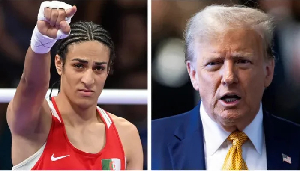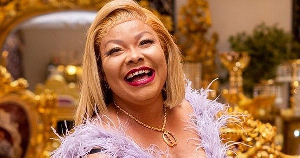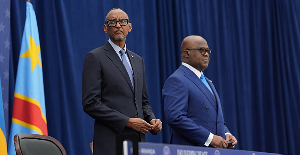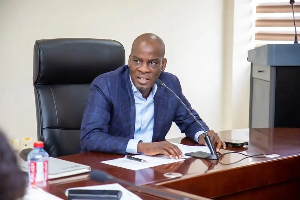The Member of Parliament for North Tongu Mr. Samuel Okudzeto Ablakwa has opined that the more women we have in peacekeeping mission, the likely the operation will be effective.
The Minority’s spokesperson on foreign affairs made the remarks in his submission on the floor of parliament on Friday, May, May 29, 2020 as the nation observes UN Peacekeepers Day and celebrate female peacekeepers as Ghana marks 60 years of enviable troop deployment.
”Mr. Speaker, as the UN has highlighted: more women in peace operations means more effective peacekeeping. Women peacekeepers improve overall peacekeeping performance, have greater access to communities particularly communities where women are discouraged from speaking to men, help build trust and confidence, help in promoting human rights and the protection of civilians. May I on this note acknowledge for high praise Ms. Phyllis Ama Tebuah Osei who won the annual UN Female Police Officer of the Year Award,” he said.
He also used the opportunity to commend our gallant men and women on peacekeeping missions saying: ”
May I therefore salute and congratulate the men and women in uniform and all our Commanders-in-chief for the honour they have brought our dear country over the last six decades. Those who fell to bring us glory shall never be forgotten.
Mr. Speaker, with more than 1 million men and women serving in diverse capacities over the years, impacting and saving lives, the UN Peacekeeping currently deploys over 95,000 military, police and civilian personnel in 13 operations.
Aiming at the prevention of conflicts between Nations and the erasure of the occurrence of wars, the UN Peacekeeping has faced enormous challenges despite its numerous success stories, especially in the post cold war era.”
Read his full statement below
COMMEMORATIVE STATEMENT BY HONOURABLE SAMUEL OKUDZETO ABLAKWA, MEMBER OF PARLIAMENT FOR THE NORTH TONGU CONSTITUENCY AND RANKING MEMBER, FOREIGN AFFAIRS COMMITTEE TO MARK THE INTERNATIONAL DAY OF UNITED NATIONS PEACEKEEPERS AND TO CELEBRATE 60 YEARS OF GHANA’S TROOPS CONTRIBUTION TO UN PEACE OPERATIONS
Rt. Hon. Speaker,
The General Assembly of the United Nations by its resolution 57/129, designated the 29th day of May as the International Day of United Nations Peacekeepers, the date when in 1948 the first UN Peacekeeping Mission named the “United Nations Truce Supervision Organisation (UNTSO)” began operations in Palestine to monitor the Armistice Agreement between Israel and its Arab neighbours.
Peace Operations is often considered as the international community’s primary tool for advancing global peace and security.
Mr. Speaker, the UN Peacekeeping since its inception in 1948 has undertaken a total of 72 missions in the world with about 16 of those in Africa beginning from the year 1960 when Ghana under the leadership of the Osagyefo Dr. Kwame Nkrumah contributed its first personnel to help restore peace in the then Republic of the Congo.
Significantly, this year marks exactly 60 years since Ghana’s first peace operations deployment in the Congo (ONUC). Ghana’s iconic role in global peace operations has seen many subsequent unwavering and consistent troops deployment in UN and regional led peace operations including 1973 in Egypt (UNEF II), 1979 in Lebanon (UNIFIL), 1990 in Liberia (ECOMOG), 1992 in Cambodia (UNTAC), 1993 in Rwanda (UNAMIR), 1998 in Sierra Leone (UNAMSIL), 2001 in DRC (MONUC), 2002 in Cote d’Ivoire (two missions of ECOMICI and UNOCI), 2003 in Liberia (two missions of ECOMIL and UNMIL), 2008 in Chad (MINURCAT), 2010 in DRC (MONUSCO), 2013 in Mali (MINUSMA) and 2014 in South Sudan (UNMISS).
Mr. Speaker, Ghana’s foreign policy which has remained in principle and in material essence largely unchanged from independence can be credited for Ghana’s enviable peace operations reputation. The records of this august House reveal that on 16th December, 1959 when Prime Minister Kwame Nkrumah presented Ghana’s Foreign Policy to the then National Assembly, he said: “In pursuance of the country’s policy of peace and friendship, the Government and people of Ghana are determined not to get themselves entangled in the great ideological conflicts of the great powers as manifested in the Cold War which divides the world into East and West Power Blocs. The policy of non-alignment should not be interpreted to mean that the Government of Ghana will choose to play the role of silent spectators in world affairs, or in matters which affect the country’s vital interest and the destiny of the African people. The policy is a positive policy based upon the state’s firm belief in positive action.”
May I therefore salute and congratulate the men and women in uniform and all our Commanders-in-chief for the honour they have brought our dear country over the last six decades. Those who fell to bring us glory shall never be forgotten.
YOU MIGHT ALSO LIKE.. Over 50 more workers of Tullow test positive to COVID-19
Rawlings reacts to George Floyd murder
Mr. Speaker, with more than 1 million men and women serving in diverse capacities over the years, impacting and saving lives, the UN Peacekeeping currently deploys over 95,000 military, police and civilian personnel in 13 operations.
Aiming at the prevention of conflicts between Nations and the erasure of the occurrence of wars, the UN Peacekeeping has faced enormous challenges despite its numerous success stories, especially in the post cold war era.
This day presents us all a very opportune occasion to pay homage to the uniformed and civilian personnel’s invaluable sacrifice and contributions over the years in the numerous missions all over the world serving in very critical capacities in mostly dangerous situations at various theatres of conflict.
Mr. Speaker, the day also additionally affords us all the opportunity to pay tribute to the about 3,900 peacekeeping heroes who have fallen whilst serving under the UN flag since 1948 including the 102 who died last year alone.
Last year, two fallen Ghanaian peacekeepers, namely, Frank Sammy Kwofie who was a Deputy Commissioner of the Police service and served in the UN Africa Mission in Darfur (UNAMID) and CPL Mercy Adade, who also served with the UN Interim Force in Lebanon (UNIFIL) were among the over 100 others who posthumously received the Dag Hammarskjold medal awarded to peacekeepers who have fallen while serving in the cause of peace. May their souls rest in peace and may their sacrifice never be lost to the world.
Ghana is amongst the top 10 contributors to UN peacekeeping, currently contributing about 3,000 military and police personnel to about eight missions across the world.
Mr. Speaker, ‘Women in peacekeeping: A key to Peace” is the theme for this year’s celebration which also marks the 20th anniversary of the adoption of the UN Security Council Resolution 1325 on women, Peace and Security.
The UN recognizes the important role women peacekeepers play in their missions especially in the promotion of human rights, protection of civilians and the improvement of the overall peacekeeping performance and therefore highlights their efforts whilst encouraging even more female participation in peace building and the political processes.
Between 1957 and 1989, only 20 uniformed women served as UN peacekeepers. In 1993, women made up only 1% of deployed uniformed personnel. In 2019, out of approximately 95,000 peacekeepers, women constituted 4.7% of military contingents and 10.8% of formed police units in UN peacekeeping missions. Progress has been slow in this regard and it is the reason the UN by Security Council Resolution 1325 as well as the Action for Peacekeeping (A4P) Declaration of Shared Commitments, the UN has called for an expansion of the role and contribution of women in its operations including of uniformed women peacekeepers. It is worthy of note that A4P has thus far been signed by 152 UN Member States including Ghana. The 2028 target for women serving in military contingents is 15%, and 25% for military observers and staff officers; 20% for women serving in formed police units and 30% for individual police officers.
Mr. Speaker, as the UN has highlighted: more women in peace operations means more effective peacekeeping. Women peacekeepers improve overall peacekeeping performance, have greater access to communities particularly communities where women are discouraged from speaking to men, help build trust and confidence, help in promoting human rights and the protection of civilians. May I on this note acknowledge for high praise Ms. Phyllis Ama Tebuah Osei who won the annual UN Female Police Officer of the Year Award.
Mr. Speaker, this year, UN Peacekeeping Missions have had to grapple with yet another layer of threat, as the COVID-19 Pandemic and the challenges it presents have had to be managed by Peacekeepers along-side their pre-existing risky schedules.
Peacekeepers have played a very important role in the fight against the COVID-19 Pandemic so far, assisting governments and communities in their response with especially the protection of women, children and vulnerable senior citizens. Peacekeepers serving in the frontlines and playing an integral role in this endeavor in the midst of all the current constraints and need for extra precautionary measures to protect themselves, those they are serving and their loved ones deserve our gratitude and applauds.
Mr. Speaker, permit me to use this opportunity to appeal for a greater role for the military in combating COVID-19 here in Ghana. Reports of challenges with COVID-19 medical supplies distribution and the allocation of relief items can be resolved and better managed with precision when we involve the military.
Today, we honour our gallant troops – those fallen and those alive who have held high the flag of Ghana in various theatres of conflict over the past six decades. This House, this great nation and all Africans are eternally proud of your achievements and your contributions to global peace and security.
Mr. Speaker, I am deeply grateful and humbled for the opportunity.
General News of Saturday, 30 May 2020
Source: rainbownradioonline.com

